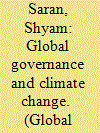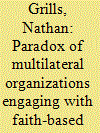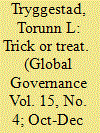|
|
|
Sort Order |
|
|
|
Items / Page
|
|
|
|
|
|
|
| Srl | Item |
| 1 |
ID:
092252


|
|
|
| 2 |
ID:
092256


|
|
|
|
|
| Publication |
2009.
|
| Summary/Abstract |
Environmental challenges create high-stakes choices in war-torn societies. Handled well, they may create a solid foundation for peace and sustainable development; handled poorly, they risk undercutting an already tenuous peace. In this article, we identify patterns and lessons from the work of the UN Environment Programme's Post-Conflict and Disaster Management Branch, which has conducted postconflict assessments in several war-torn societies over the past decade. PCDMB's experience sheds considerable light on the nature of conflict-related environmental challenges, identifies possible entry points for environmental initiatives in peacebuilding, and suggests cautions about the requirements for environmental initiatives to be peacebuilding tools. We identify four themes emerging from their work: the multiple and often indirect links between violent conflict and environmental degradation; the political dimensions of environmental assessment as a confidence-building tool; resource and environmental linkages among the different segments of war-torn economies; and the environmental dimensions of reconstituting the state, regulation, and the rule of law.
|
|
|
|
|
|
|
|
|
|
|
|
|
|
|
|
| 3 |
ID:
092254


|
|
|
| 4 |
ID:
092251


|
|
|
| 5 |
ID:
092257


|
|
|
|
|
| Publication |
2009.
|
| Summary/Abstract |
Multilateral organizations, such as the World Health Organization, have traditionally not closely engaged with faith-based organizations. However, more recently, there has been a growing willingness among MOs to engage with FBOs. Factors promoting this engagement have included the rise of economic neoliberalism and participatory paradigms, a realization that FBOs may enhance program effectiveness, and a need for greater cooperation to respond to HIV/AIDS. At the same time, paradoxically, engagement with FBOs conflicts with the Enlightenment ideology on which most MOs are based. This ideology has traditionally espoused secularism and relegated faith to the private domain. To reconcile this paradox, MOs have often imposed conditions requiring FBOs to remove faith activities from their programs. This potentially compromises the unique cultural identity of the FBO.
|
|
|
|
|
|
|
|
|
|
|
|
|
|
|
|
| 6 |
ID:
092255


|
|
|
|
|
| Publication |
2009.
|
| Summary/Abstract |
Public financial institutions (PFIs) provide vital investment for poor countries, and act as catalysts for additional private capital. However, the projects thus financed often have social and environmental side effects. Safeguards systems control such side effects. This article compares the strength of PFIs' safeguards systems. Although the study uses financing for dams as an example, the issue has much larger applicability. In fact, all development project or policy interventions have social or environmental side effects and therefore necessitate safeguards. This article notably finds substantive evidence that safeguards performance substantially differs between different PFIs. It argues that the most important explanations for this finding are differences in coordination mechanisms among different PFIs, and diverging interest group pressure on different PFIs. Finally, the article explores several avenues for future work following from these findings, notably exploring steps to harmonize PFIs' safeguards performance.
|
|
|
|
|
|
|
|
|
|
|
|
|
|
|
|
| 7 |
ID:
092258


|
|
|
|
|
| Publication |
2009.
|
| Summary/Abstract |
Despite new interest in the implications of growing institutional density for international cooperation, and in so-called public-private governance, the interplay between public and private regimes has so far been largely overlooked. This article draws on the emerging literature on parallel regimes in international governance to analyze the evolution of the norms and rules governing sovereign debt restructuring from the early 1980s to the mid-2000s, with a particular focus on the interplay between those covering official bilateral (or Paris Club) debt, and those dealing with private credits. It shows how, from the mid-1990s onward, changes in market and political environments turned burden sharing between bilateral and private creditors into a contentious issue, partly undermining the existing framework for public-private cooperation, and confirms that a focus on institutional interplay can help identify some of the key dynamics behind public-private cooperation.
|
|
|
|
|
|
|
|
|
|
|
|
|
|
|
|
| 8 |
ID:
092253


|
|
|
| 9 |
ID:
092259


|
|
|
|
|
| Publication |
2009.
|
| Summary/Abstract |
The adoption in October 2000 of UN Security Council Resolution 1325 on Women, Peace and Security is regarded as a groundbreaking achievement in putting women's rights on the peace and security agenda of the UN. Critics have suggested that the adoption of this resolution has made little difference in terms of changed policies and practices. I argue, however, that it has nevertheless made a difference. The adoption of Resolution 1325 is the expression of a new norm in the making. Furthermore, it illustrates how cross-cutting thematic issues such as "women, peace, and security" today are placed on the agenda and nurtured by the UN Secretariat in close cooperation not only with member states, but, just as important, with networks of nongovernmental organizations and individual experts
|
|
|
|
|
|
|
|
|
|
|
|
|
|
|
|
|
|
|
|
|